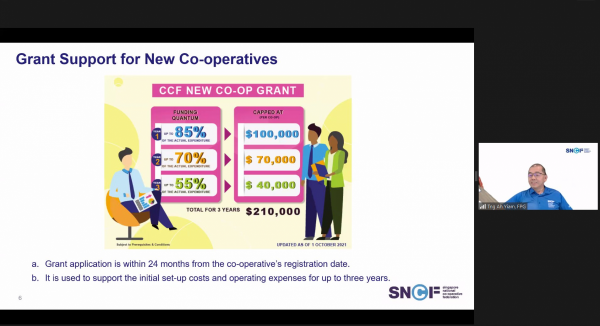
On 13 July, the Institute of Policy Studies and Tote Board organised a virtual panel discussion on “Non-Traditional Forms of Cooperation and Cooperatives.” It delved into how platform cooperatives can generate social mobility and economic inclusion for marginalised communities.
Mr. Tng Ah Yiam, Chairman, Singapore National Co-operative Federation (SNCF) was invited as a guest panelist. Joining Mr. Tng were Associate Professor Trebor Scholz, Founding Director of The Platform Cooperativism; Ms. Kate Khatib, the Co-director of community wealth cooperative Seed Commons and Worker-Owner of cooperatively-owned restaurant and bookstore in Baltimore Red Emma’s Bookstore Coffeehouse; and Dr. Hong Renyi, Assistant Professor at the Department of Communications and New Media in the National University of Singapore. The panel discussion was moderated by Dr Justin Lee, a Senior Research Fellow at IPS.
The Pros of Platform Coops
Platform cooperatives are jointly owned and democratically controlled platforms that operate on the basis of self-help and mutual assistance. Unlike traditional cooperatives, platform cooperatives often leverage digital or online platforms, like a website or a mobile application, to exchange three key units: information, goods and services, and a currency.
The boom in the digital economy has created many opportunities for organisations, including cooperatives, to drive engagement with their community members. This acceleration also brought about demerits, such as exploiting regulations and creating digital giants that dominate the market. The platform economy, and platform cooperatives, hold much potential to provide more and fairer income and improve collaboration between key stakeholders. Some of the other benefits include higher quality jobs, lower worker turnover, more control over privacy, and transparency of the business.
Prof. Scholz highlighted how gig workers, whether they are Uber drivers or housecleaners, could consider forming a platform cooperative to empower one another. Just like in his 2018 TED Talk “Stuck in the gig economy? Try platform coops instead,” Prof. Scholz shared the successful case study of housecleaner Esmeralda Flores who joined a platform cooperative in New York City and earned twice as much per hour as compared to when working in her previous company. She also received training in finance and management and conflict resolution. “There’s no algorithm boss at her company that changes the pay or hours from under her feet, so she has some stability for her family,” he said in the TED Talk.
“Power is decentralised in platform cooperatives because every member has a vote,” Prof. Scholz said.
Ms. Khatib seconded his stance. The writer and entrepreneur, based in the city of Baltimore in Maryland, shared her journey of setting up Red Emma’s Bookstore Coffeehouse back in 2004 before co-founding the community wealth cooperative Seed Commons. The latter aims to channel investment to marginalised communities that faced the brunt of the extractive economy, deindustrialisation, and systemic discrimination, making community-controlled finance available to cooperatively-owned businesses.
She said, “Across all the coops (and actors) that benefitted from Seed Commons, workers make a living wage, are provided with some degree of health care, and all of them have a pathway for their employees.”
Beyond giving power to community-based actors to do good, cooperatives can also be agents of inclusivity. Addressing the declining population and the diverse demographics of people in Baltimore, Ms Khatib said, “Generally, the workers' retention rate in coops is high because these businesses directly impact their members, including minority groups."
“For a coop to really function and be successful, it is imperative that decision-making power is held in the hands of people impacted by those decisions,” she said in an interview with Bloomberg Businessweek.
What Else Is Needed
As the apex body of Singapore’s Cooperative Movement, SNCF endeavours to help its cooperatives strengthen their enterprises so they can better serve their members and the broader community, and transform the national economy.
Mr. Tng, who is a veteran of the National Trade Union Congress (NTUC) FairPrice, a cooperative and also Singapore’s largest supermarket chain, agrees that cooperatives and social enterprises could consider adopting the platform model to expand their reach and impact communities.
He elaborated that SNCF has been helping aspiring cooperative players leverage grants provided to set up their entities. These grants can help new and veteran cooperative players offset costs or develop talents to bolster their operations. He said, “We are here to promote and develop cooperatives as sustainable enterprises to address social and economic needs.”
Interestingly, while the cooperative ecosystem is robust, not everybody is aware of the values cooperatives have in societies, said the panel discussion’s last speaker Dr. Hong. He highlighted that cooperatives are not only business units, but are cultural units too. Simply put, cooperatives are all about rising with others. He said, “Coops give people a chance to get a sense of who they can be.”
In his remarks, Dr. Hong also quipped about whether members in a platform cooperative need the technical expertise to manage a digital platform and whether the lack thereof might put forward barriers to entry. Education and upscaling are thus paramount to equip members with the skillsets needed to operate an online platform.
Mr. Tng had earlier shared how Singapore-based service cooperative Employment for Persons with Intellectual Disabilities (E4PID) is looking to launch a new commercial website for its “Mushroom Buddies” initiative. The initiative, which employs persons with special needs to grow and harvest mushrooms in an urban farm container, will allow members of the public to purchase and support the cooperative’s cause online. E4PID is presently working with volunteers to set up the website and streamline the workflow needed for the process.
In the same post-panel discussion interview, Prof. Scholz explained, “Municipalities are crucial to the success of all cooperatives. Without regulatory support, platform cooperatives cannot win.”
But this does not mean that keen cooperative players should forgo the model. Studies are proving that countries with high rates of worker cooperatives had higher measures of trust in societies or how cooperatives are capable of building social trust. Mr. Tng added, “Platform coops that make use of digital platforms can be a force of social good.”



